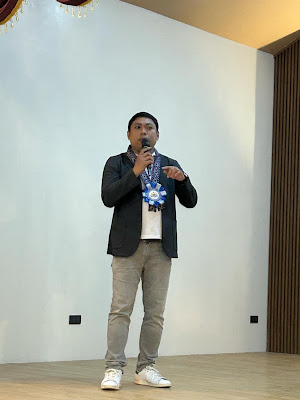I recently had the privilege of stepping into the vibrant halls of La Consolacion University Philippines - Main Campus in Malolos, Bulacan, as a resource speaker for Grade 11 and 12 students specializing in Technical-Vocational-Livelihood (TVL) Computer Programming and Computer System Servicing. The event, titled Equipping Future Tech Professionals: A Work Immersion Seminar-Workshop on AI, Cybersecurity, and Robotics, was held at the St. Augustine Building - AVR. While the broader seminar covered various topics, I delivered a focused talk on Artificial Intelligence specifically Generative AI (GenAI), aiming to introduce these young minds to one of the most transformative technologies of our time. Reflecting on the experience, I am filled with gratitude, inspiration, and a renewed sense of purpose.
Why Generative AI?
Generative AI is not just a buzzword—it’s a paradigm shift.
As industries worldwide embrace AI-driven solutions, it’s crucial for the next
generation of tech professionals to understand its potential and implications.
I chose this topic because it’s timely, relevant, and aligns with the rapid
adoption and advancements of AI across industries. My preparation was rooted in my own learning
journey, particularly through the Generative AI
Learning Path on Google Cloud Skills Boost. This foundational
knowledge, combined with my passion for emerging technologies, fueled my desire
to share insights with these students.
Key Insights Shared
During my talk, I provided a foundational overview about Generative AI. Here are the key points I delivered:
- Market
Insights: I shared data on the exponential growth of the Generative AI
market, its enterprise adoption, and its industry-specific applications such as in healthcare, finance, marketing, education, etc.
- AI
Fundamentals: I broke down the concepts of Artificial Intelligence,
Machine Learning, Deep Learning, and Generative AI, ensuring students
understood the distinctions and connections.
- Core
Components: We explored the building blocks of Generative AI,
including Machine Learning Models, Neural Networks, and the art of Prompt
Engineering.
- Key
Technologies: I introduced them to Large Language Models (LLMs),
Transformer Architectures, and Generative Adversarial Networks (GANs).
- Ethical
Challenges: We discussed the importance of addressing bias,
hallucinations, privacy concerns, and copyright issues in AI development
and usage.
- The
Future of AI: I emphasized that while challenges exist, the
opportunities for innovation and efficiency far outweigh the risks.
The students’ enthusiasm was noticeable. Over the course of
two hours, they listened attentively, asked thoughtful questions, and engaged
deeply with the topic. Their curiosity was evident in the Q&A session,
where they posed questions ranging from the technical aspects of AI to its
societal impact. One student asked, “How can we ensure AI is used
ethically in the future?” Another wondered, “What skills
should we focus on to stay relevant in the age of AI?” These questions
reflected their genuine interest and desire to understand the technology
shaping their future.
Memorable Moments
The Q&A session was undoubtedly the highlight of the
seminar. It was heartening to see students actively participating and thinking
critically about the implications of AI. I encouraged them not to fear AI but
to embrace it as a tool to augment their capabilities. I shared that upskilling
is key—learning how to leverage AI effectively will set them apart in the tech
landscape.
One moment that stood out was when a student asked, “Will
AI take away our jobs?” I responded by emphasizing that while AI will surely automate certain tasks, it will also create new opportunities. The goal is to
adapt, learn, and grow alongside the technology.
The Impact I Hope to Leave
My greatest hope is that I sparked curiosity and inspired
these students to explore AI further. I encouraged them to take advantage of
online learning platforms, experiment with AI tools, and stay informed about
emerging trends. AI is reshaping the way we live and work, and understanding it
is no longer optional—it’s essential.
Personal Takeaways
This experience was both humbling and motivating. Being
invited to share my knowledge with such an eager audience was an honor. It
reinforced my belief in the importance of continuous learning and the power of
education to transform lives. It also inspired me to deepen my own
understanding of AI and cybersecurity so I can contribute even more
meaningfully in future speaking engagements.
A Message to Educators, Students, and Future Tech
Professionals
To educators: Embrace the responsibility of preparing
students for a future dominated by AI. Integrate emerging technologies into
your curricula and foster a culture of curiosity and innovation.
To students: The future belongs to those who are willing to
learn and adapt. Generative AI is not just a tool—it’s a gateway to endless
possibilities. Equip yourselves with the skills and knowledge to harness its
potential.
To future cybersecurity professionals: As AI evolves, so do
the challenges of securing it. Understanding AI’s intricacies will be critical
in safeguarding our digital future.



No comments:
Post a Comment